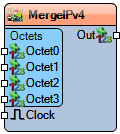Merge Octets To Unsigned TCP/IP IPv4 Address
File:TArduinoMergeOctetsToUnsignedIPv4.png
Summary
Merges four individual octets into a single unsigned 32-bit integer representing an IPv4 address.
Description
The **Merge Octets To Unsigned TCP/IP IPv4 Address** component combines four 8-bit octets into a 32-bit unsigned integer value. This value represents a complete IPv4 address in numeric form, making it useful for networking applications, comparisons, or storage. The **Initial Value** property defines the default 32-bit output at startup.
Diagram:
Categories
- File:TArduinoNetworkCategory.png Category Network – Networking and IP address handling.
- File:TArduinoIntegerCategory.png Category Integer – Integer and numeric manipulation.
Properties
- Enabled – Enables or disables the component.
- Initial Value (default 0) – Sets the default IPv4 address as a 32-bit unsigned integer.
Pins
Input Pins
- Octet0 – First octet of the IPv4 address.
- Octet1 – Second octet of the IPv4 address.
- Octet2 – Third octet of the IPv4 address.
- Octet3 – Fourth octet of the IPv4 address.
- Clock – Triggers update of the output unsigned value.
Output Pins
- Out (unsigned) – 32-bit unsigned integer representing the IPv4 address.
